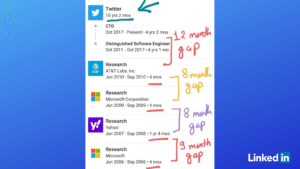
Even though we are in the midst of the Great Resignation and a hard-fought war for talent, companies continue to be ridiculously picky over job applicants. You’d think that human resources professionals and hiring managers would be open-minded with respect to candidates, during this tight job market. It would be reasonable to believe that a business-savvy supervisor would cast aside too many requirements that serve as a barrier to entry, so that they can bring a person on board quickly.
When companies elongate the interview process and demand too much of applicants, it causes a cascade of problems for the organization and its people. When interviews last forever, requiring three to 10-plus interviews that take place over the course of up to six months, the job hunter formulates a bad opinion of the firm and will likely pull out of consideration. They’ll share their story with others, which makes the tone-deaf company look bad, which will then hurt their recruitment and retention.
The remaining employees in the group start feeling put upon. They’re pressured to pick up all the slack from the person who resigned. As weeks go by without anyone new brought aboard to help with the workload, the remaining may believe that there could be some serious issues as to why they are not finding a replacement. If this takes too long, they’ll say that they are being taken advantage of or maybe the company is going through financial difficulties and can’t afford to hire new employees. This will prompt the overworked employees to start looking for a new job.
One of the things that hiring managers and HR people don’t like is an applicant that has gaps on their résumé. They tend to rudely question why the person switched jobs so often. The folks involved with the interviewing process will presume that there may be a problem with the applicant, as they can’t keep a job for an extended period of time, and wonder why it’s taking them awhile to find a new position. Afraid to take the risk of hiring someone who they contend may quickly leave or could be a problem, it’s easy to take a hard pass and move onto other candidates.
Jack Dorsey, the former CEO of Twitter, announced that he was stepping down last week. Dorsey handed the reins over to 37-year-old Agrawal, making him the youngest CEO among the S&P 500. If you take a peek at his LinkedIn bio, it looks like he is a job hopper, as Agrawal had short-term stints at a number of companies, with gaps between many of them. Scrutinizing his bio more closely, it seems that his jobs or contracts were while Agrawal pursued a doctorate from Stanford University. It’s only when he landed at Twitter that he had some stability.
The irony is that many companies would look askance at a worker who made so many moves. If Twitter acted this way, it never would have hired Agrawal, who, presumably based on the promotion from CTO to CEO, is an amazing person. Sadly, everyday, regular working people are passed over all the time because of the antiquated notions that you shouldn’t move around too often.
Steve Cadigan, the first HR director at LinkedIn, says that people should quit quickly and often. I’m paraphrasing his concept. After being in the HR world for 30-plus years, he realized that workers should gain knowledge, make connections and cultivate a network, then if there isn’t room to advance, start looking for the next job. Then, rinse and repeat the process. He predicts that this will be the future of working and navigating your career trajectory.
Gaps on a résumé is only one of the many challenges that job seekers face. They are treated rudely in the interview process, don’t receive feedback and get ghosted. Interviews last forever. Oftentimes, candidates are required to take invasive psychometric assessments, prepare reports and assigned tasks, like creating projects for free. Hopefully, HR and leadership will wake up to the fact that they are losing great employees by their outdated attitudes toward résumés and switching jobs.
Here are some of the responses to Narula’s LinkedIn post:
Krishna Priya, Scrum Master, Standard Chartered Bank
“Very true. Gaps in the career [don’t] mean that they are inefficient or incapable. Please go by their knowledge and not by experience, as being in the same company for so long also not a good sign.”
Alex Chiomny, Founder and Owner, A.C.H. Homes (Investment Properties)
“This is really stupid. Maybe I am taking courses, maybe I am developing my own business or maybe I just can take a break, because I can. No one’s business. Corporate slavery mentality. If you won’t invest in yourself and create gaps, [you] will be stuck till retirement.”
Jordan Hall, Managing Director, Libertyware Limited
“[One-hundred percent], I often get overlooked [and] questioned a lot about my short-term contracts. Truth is, I go in places, fix other contractors issues and leave because my job [is] done. What’s more funny is when they don’t realize that I have repeat customers.”
Nonye Umahi, Managing Consultant, Cuanu Resources and Technical Services Ltd.
“As a recruiter, I am always attracted to gap years. Good CVs with gap years, always have something interesting that happened then, and creates more insight on the candidate.”
Juliana Quadros Mollica, Director of Innovation and Quality Assurance, Havn Life
“His career advancements and fast-paced changes mirror a trait many leaders share. Absorbing knowledge, contributing to the organization, Plato of learning vs contribution achieved so it’s time to take off 🚀. Enrolling in new courses, not working for a bit, focused in personal growth. Aiming for a new challenge, new learnings. It’s a cycle present in driven individuals.”
Shreya G., Data Analyst, DecisionTree Analytics & Services
“This post is prime example of half knowledge can be dangerous and lead to wrong analysis 🙄.”
Source: Forbes


